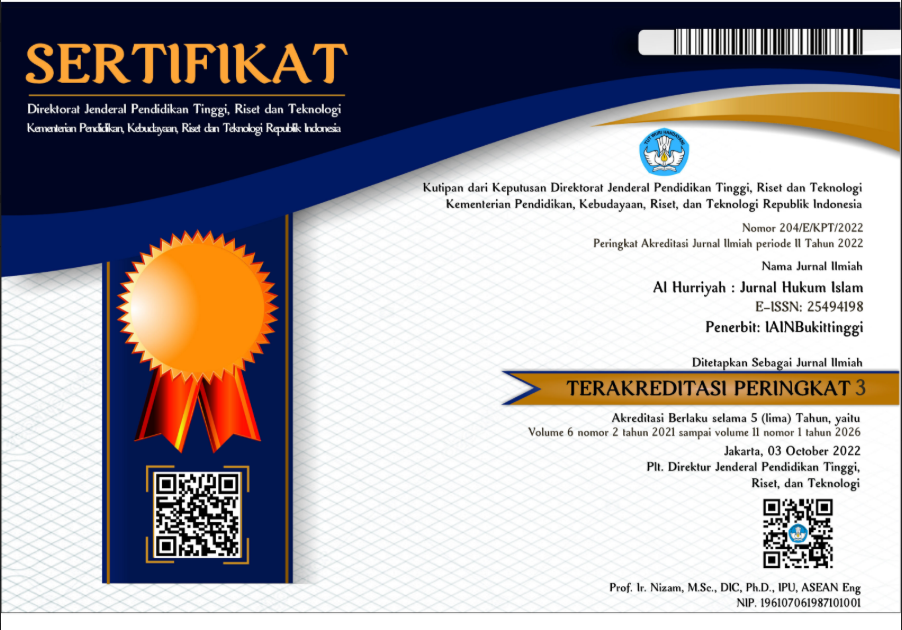KEDUDUKAN BAK PENCUCI KAKI SEBELUM MASUK DAN KELUAR TEMPAT BERWUDHUK DALAM TINJAUAN FIQH IBADAH
DOI:
https://doi.org/10.30983/alhurriyah.v3i1.538Abstract
References
Azadi, Abû Dâwûd Sulaimân ibn al-Asy'ab ibn Ishâq ibn Basyîr ibn Syidâd ibn Umar al-, Sunan Abî Dâwûd. Juz 1. Beirut: al-Maktabah al-'Ishriyah, [tth]
Bahûtîy al-Hanbalîy, Manshûr ibn Yûnus ibn Shalâh al-Dîn in Hasan ibn Idrîs al-, Kasyf al-Iqnâ' 'An Matan al-Iqnâ'. Juz 1. Beirut: Dâr al-Kutub al-ilmiyah, [tth]
Bâqi, Muhammad Fu`âd ‘Abd al-, al-Lu`lu` wa al-Marjân fî Mâ Ittifâq al-Syaikhân. Juz 1. Beirut Libanon: Dâr al-Fikr, [tth]
Bukhârî al-Ja'fîy, Muhammad ibn Ismâ’îl Abu Abdillâh al-, al-Jâmi' al-Musnad al-Shahîh al-Mukhtashar min Umûr Rasûlillâh SAW wa Sunanuh wa Ayyâmuh. Juz 1. Dâr al-Thawwâf al-Najâh, [tth]
Burhan al-Din Abu al-Hasan, al-Hidayah fi Syarh Bidayah al-Mubtadi. Juz 1. Beirut: Dar Ihya` al-Turats al-‘Arabi, [tth]
Da'âs, Gharrat Ubaid al-, al-Qawâ'id al-Fiqhiyah Ma'a al-Syarh al-Mujâz. Cet.3. Beirut: Dâr al-Tirmidzi, 1989
Dimisyqi al-Hanbali al-, Musthafa ibn Sa’ad ibn ‘Abdih al-Suyuthi Syahrah, Mathalib Uli al-Nuha Fi Syarh Ghayah al-Muntaha. Juz 1. Ttp: Maktabah al-Islami, 1994
Farnathi, ibn Juzi al-Kalbi al-, al-Qawanin al-Fiqhiyah. Juz 1. Ttp: [tth]
Ghâzî, Muhammad ibn al-Qâsim al-, Fath al-Qarîb al-Mujîb. Indonesia: Dâr al-Ihyâ` al-Kitâb al-‘Arabiyah, [tth]
Jazîrî, ‘Abd al-Rahmân al-, al-Fiqh ‘Alâ Madzâhib al-Arba’ah. Juz 1. Kairo: Mathba’ah Istiqâmah, [tth]
Khîn, Musthafâ dan Musthafâ al-Bughâ al-, al-Fiqh al-Manhâjîy 'Alâ Madzhab al-Imâm al-Syâfi’î. Juz 1. Damaskus: Dâr al-Qalam, 1992
Malibârî, Zain al-Dîn ibn ‘Abd al-Azîz al-, Fath al-Mu’în bi Syarh al-Qurrata al-‘Uyûn. Semarang: Karya Toha Putra, [tth]
Munawwir, Ahmad Warson, Kamus Al-Munawwir. Yogyakarta: Pustaka Progresif, 1997
Naisabûrî , Muslim ibn Hajjâj Abû al-Hasan al-Qusyairî al-, al-Musnad al-Shahîh al-Mukhtashar Bi Naql al-'Adl Ilâ Rasûlillâh SAW. Juz 1. Beirut: Dâr Ihyâ` al-Turâts al-'Arabiy, [tth]
Nasâ`îy, Abû Abdirrahmân Ahmad ibn Syu'aib ibn Ali al-Kharasânîy al-, al-Sunan al-Shughrâ li al-Nasâ`îy. Juz 1. Halab: Maktab al-Mathbu'ât al-Islâmiyah, 1987
Nawawîy, Abû Zakariyâ Muhyi al-Dîn Yahyâ ibn Syarf al-, al-Majmû’ Syarh al-Muhadzdzab. Juz 1. Beirut: Dâr al-Fikr, [tth]
Quzwainîy, Ibn Mâjah Abû Abdillâh Muhammad ibn Yazîd al-, Sunan Ibn Mâjah. Juz 1. Dâr al-Ihyâ` al-Kutub al-'Arabiyah, [tth]
Sâbiq, Sayyid, Fiqh al-Sunnah. Juz 1. Kairo: Thabâ’ah Khassah al-Fathu Li al-I’lâm al-‘Arabi, 1365 H
Syarnabilali al-Mishri al-Hanafi, Hasan ibn ‘Amar ibn ‘Ali al, Nur al-Idhah wa Najah al-Arwah fi Fiqh al-Hanafi. Juz 1. Ttp: al-Maktabah al-‘Ashriyah, 2005
Syurbainîy al-Syâfi’î, Syams al-Dîn Muhammad ibn Ahmad al-Khatîb al-, al-Iqnâ' fi Hilli Alfâzh Abî Sujâ'. Juz 1. Beirut: Dâr al-Fikr, [tth]
Taqiy al-Dîn al-Syâfi’î, Abû Bakar ibn Muhammad ibn ‘Abd al-Mukmin ibn Hâriz ibn Ma'la al-Husainîy al-Hashanîy, Kifâyah al-Akhyâr fi Hilli Ghâyah al-Ikhtishâr. Damaskus: Dâr al-Khair, 1994
‘Ubaid, al-Hajjah Kawkab, Fiqh al-‘Ibadat ‘Ala al-Madzhab al-Maliki. Juz 1. Damaskus: Mathba’ah al-Insya`, 1986
Published
How to Cite
Issue
Section
Citation Check
License
Authors who publish with this journal agree to the following terms:
- Authors retain copyright and grant the journal right of first publication with the work simultaneously licensed under a Creative Commons Attribution-ShareAlike 4.0 International License that allows others to share the work with an acknowledgment of the work's authorship and initial publication in this journal.
- Authors are able to enter into separate, additional contractual arrangements for the non-exclusive distribution of the journal's published version of the work (e.g., post it to an institutional repository or publish it in a book), with an acknowledgment of its initial publication in this journal.
- Authors are permitted and encouraged to post their work online (e.g., in institutional repositories or on their website) prior to and during the submission process, as it can lead to productive exchanges, as well as earlier and greater citation of published work (See The Effect of Open Access).





